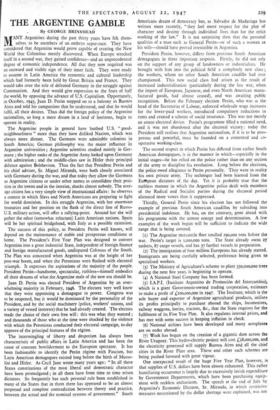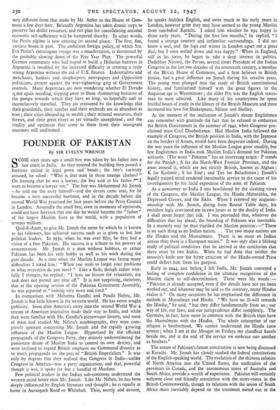THE ARGENTINE GAMBLE
By GEORGE BRINSMEAD
MANY Argentines during the past thirty years have felt them- selves to be members of an embryo super-race. They have considered that Argentina would prove capable of creating the New World that Columbus merely discovered. When Europe wrecked itself in a second war, they gained confidence—and an unprecedented degree of economic independence. All that they now required was an outward and visible sign of their inner faith. They were ready to assume in Latin America the economic and cultural leadership which had formerly -been held by Great Britain and France. They would take over the role of defeated Germany in the struggle against Communism. And they would give expression to the fears of half the world, by opposing the advance of U.S. Capitalism. Opportunely, in October, 1945, Juan D. Per6n stepped on to a balcony in Buenos Aires and told his compatriots that he understood, and that he would fulfil, all their desires. Thus did the foreign policy of the Argentine nationalists, so long a mere dream in a land of horizons, begin to operate in reality.
The Argentine people in general have loathed U.S. " good- neighbourliness " more than they have disliked Nazism, which was always more distant. The Germans were admirable colonists in South America; German philosophy was the major influence in Argentine universities ; Argentine scientists studied mainly in Ger- many ; the higher ranks of the Argentine Army looked upon Germany with admiration ; and the middle-class saw in Hitler their principal defence against Bolshevism. Thus the fact that President Peron and his chief adviser, Sr. Miguel Miranda, were both closely associated with Germany during the war, and that today they allow the Germans as Argentine citizens or under other names to consolidate their posi- tion in the towns and in the interior, shocks almost nobody. The aver- age citizen has a very simple view of international affairs: he observes a contest in which Slays and North Americans are preparing to fight for world dominion. In this struggle Argentina, with her enormous resources and her position on the flank of the direct line of Russo- U.S. military action, will offer a rallying-point. Around her she will gather the other (somewhat reluctant) Latin American nations. Spain will be her spiritual bridgehead, with Italy as a possible extension.
The success of this policy, as President Peron well knows, will depend on the maintenance of stable and prosperous conditions at home. The President's Five Year Plan was designed to convert Argentina into a great industrial State, independent of foreign finance and foreign manufactured goods, undisputed Colossus of the South. The Plan was concocted when Argentina was at the height of her post-war boom, and when the Peronistas were flushed with electoral triumph. It expresses the aspirations of the majority of the people. President Peron—handsome, spectacular, ruthless—himself embodies all their dreams of what the Argentine male of the new era should be.
Juan D. Peron was elected President of Argentina by an over- whelming majority in February, 1946. The electors very well knew that they were appointing a demagogue to power. Congress was to be reopened, but it would be dominated by the personality of the President, and by the social machinery (police, workers' unions, and a variety of vested interests) that he had already created. The electors made the choice of their own free will : this was what they wanted ; and thousands of those who at the time were shocked by the violence with which the Peronistas conducted their electoral campaign, to-day approve of the principal features of the regime.
The intermingling of liberty and despotism has always been characteristic of public affairs in Latin America and has been the cause of constant bewilderment to the European spectator. It has been fashionable to identify the Peron regime with Fascism, but Latin American demagogues existed long before the birth of Musso- lini and Hitler. As Cecil Jane wrote many years ago : " In all these States constitutions of the most liberal and democratic character have been promulgated ; in all there have from time to time arisen dictators. So frequently has such personal rule been established in many of the States that in them there has appeared to be an almost perpetual and complete contradiction between theory and practice, between the actual and the nominal systems of government." South Americans dream of democracy but, as Salvador de Madariaga has written more recently, " they feel more respect for the play of character and destiny through individual lives than for the strict working of the law." It is not surprising then that the personal qualities of a man such as General Peron—or of such a woman as his wife—should have proved irresistible in Argentina.
President Peron. however, differs from previous South American demagogues in three important respects. Firstly, he did not rely on the support of any group of landowners or industrialists. He brought with him into the political field a completely new class ; the workers, whom no other South American caudillo had ever championed. This new social class had arisen as the result of increased industrialisation (particularly during the last war, when the import of European, Japanese, and even North American manu- factured goods, had almost ceased), and was awaiting public recognition. Before the February election Peron, who was at the head of the Secretariat of Labour, enforced wholesale wage increases for the lower-paid workers, introduced compulsory reductions in rents and created a scheme of social insurance. This was not merely an astute electoral device. Peron's programme filled a national need, and it was not abandoned after the electoral victory : today the President still realises that Argentine nationalism, if it is to be pros- perous and powerful, must be founded on a contented and co- operative working-class.
The second respect in which Peron has differed from earlier South American demagogues, is in the manner in which—especially in the initial stages—he has relied on the police rather than on any section of the army to discipline his revolution. Long before the elections, the police owed allegiance to Peron personally. They were in reality his own private army. The technique had been learned from the Euttpean dictators of the day. Yet it is probably true that the ruthless manner in which the Argentine police dealt with members of the Radical and Socialist parties during the electoral period alienated more voters than it suppressed.
Thirdly, General Peron since his election has not followed the example of previous South American caudillos by subsiding into presidential indolence. He has, on the contrary, gone ahead with his programme with the utmost energy and determination. A few examples of the work begun will be sufficient to indicate the wide range that is being covered.
(i) The Argentine mercantile fleet totalled 290,000 tons before the war. Peron's target is r,000,000 tons. The State already owns 27 tankers, 87 cargo vessels, and has 37 further vessels in preparation.
(2) The immigration of four million Europeans has already started. Immigrants are being carefully selected, preference being given to specialised workers.
(3) The Ministry of Agriculture's scheme to plant 330,000,000 trees during the next five years is beginning to operate.
(4) A National Steel Company has been formed.
(5) I.A.P.I. (Instituto Argentino de Promoci6n del Intercambio), which is a giant Government-owned trading corporation, estimates to make a profit of kroo,000poo in 1947. The Institute, which is the sole buyer and exporter of Argentine agricultural products, utilises its profits principally to purchase abroad the ships, locomotives, railway waggons, lorries, tractors, &c., that the State requires for the fulfilment of its Five Year Plan. It also regulates internal prices, and has met with some success in keeping inflation in check.
(6) National airlines have been developed and many aeroplanes are on order abroad.
(7) Work has begun on the creation of a gigantic dam across the River Uruguay. This hydro-electric project will cost L38,000,000, and the electricity generated will supply Buenos Aires and all the chief cities in the River Plate area. These and other such schemes are being pushed forward with great vigour. One unexpected result of the huge Five Year Plan, however, is that supplies of U.S. dollars have been almost exhausted. This rather humiliating occurrence is largely due to excessively lavish expenditure by Government Departments, which have been purchasing equip- ment with reckless enthusiasm. The speech at the end of July by Argentina's Economic Dictator, Sr. Miranda, in which restrictive measures necessitated by the dollar shortage were explained, was not
very different from that made by Mr. Attlee to the House of Com- mons a few days later. Belatedly Argentina has taken drastic steps. to preserve her dollar resources, and her plan for consolidating national economic self-sufficiency will be hampered thereby. In other words, the Peron regime is now entering its second phase. The first, fine, careless boom is past. The ambitious foreign policy, of which Sra. Eva Peron's extravagant voyage was a manifestation, is threatened by the probable slowing down of the Five Year Plan. The powerful German community who had hoped to build a Hitlerian buttress in Argentina is troubled by the increased difficulty in creating a truly strong Argentina without the aid of U.S. 'finance. Industrialists and merchants, bankers and shopkeepers, newspapers and Opposition politicians, protest against the ever-tightening grip of Government controls. Many Argentines are now wondering whether El Dorado is not again receding, slipping away to those shimmering horizons of the pampa towards which they have so long, so hopefully and so inconclusively travelled. They are reassured by the knowledge that their grainlands, their ranches and their orchards are as abundant as ever ; their cities abounding in wealth ; their mineral resources, their forests, and their great rivers as yet virtually unexploited ; and the vitality and optimism that come to them from their immigrant ancestors still undimmed.



































 Previous page
Previous page